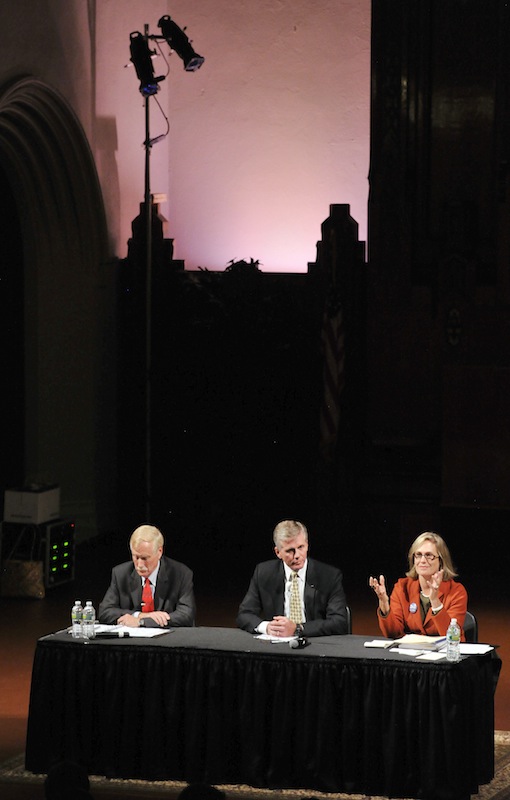A live-streamed Monday debate at the Franco-American Center in Lewiston was one of the first chances for Mainers to hear the state’s three very different major U.S. Senate candidates square off.
On Tuesday, we pulled three claims from the debate — one from each candidate — that sounded questionable to us at the time. Much more was said, however, and these points aren’t representative of the performances of Republican Charlie Summers, Independent Angus King and Democrat Cynthia Dill.
After vetting, we found a Summers claim on health care reform, a King claim on Bath Iron Works’ importance to the Lewiston job market and a Dill claim on Obama-era oil and gas production to be false.
Summers: “Yes, I would vote to repeal the Affordable Care Act in total because I believe that the last thing we need is to add another $2 trillion to an already $16 billion debt in this country.”(25:30)
Shortly after Summers said this, King questioned his numbers, saying estimates have said the Affordable Care Act, known as Obamacare, will subtract from the deficit.
King’s right. Politifact gave Republican presidential nominee Mitt Romney a “false” rating when he said Obamacare would add “trillions to our deficits.” The same has to be said for Summers, based on a bad read of an analysis of a Congressional Budget Office estimate
We weren’t sure where Summers got the $2 trillion figure, so we reached out to campaign spokesman Drew Brandewie. He cited a blog post at The Weekly Standard, a conservative magazine, which uses a CBO estimate of the law’s gross cost from 2013 to 2022 to estimate the law’s cost from 2014 to 2023, saying that it will cost more than $1.9 trillion over that time period.
However, you may notice this estimate started with gross cost. The blog post never says that’s money added onto the deficit. Gross cost estimates ignore revenue gains from the law.
If you look about a page deeper than the part of the CBO estimate used by The Weekly Standard, it says repealing coverage provisions would save $890 billion from 2013 to 2022. But it would also cut revenues and up other types of spending by $1 trillion over that time period, upping the federal deficit by $109 billion.
The CBO admits its estimates on this topic aren’t gospel because they’re based on tenuous estimates of how Obamacare will work, but Summers demonstrates a misinterpretation of their numbers. What he proposes doing, repealing the law, is estimated to increase the deficit.
We rate this statement false.
King: “The last time I checked, Bath Iron Works was the largest employer in Lewiston, so that tells you how important that company is to our state.” (38:30)
Bath Iron Works is a massive regional employer, sure, but at least two organizations, two Lewiston-based health care systems, say they employ far more Lewistonians.
Spokesman Jim Demartini said though the number of employees at Bath Iron Works is fluid, approximately 280 Lewiston residents usually are working there at a given time. They had more than 5,500 total employees in 2011, according to the Bangor Daily News.
The two health systems, St. Mary’s Health Systems and Central Maine Medical Center, are on top of a Lewiston-Auburn Economic Growth Council list of the largest employers in the area.
Systemwide at St. Mary’s, spokesman Russ Donahue said 630 Lewiston residents are employed. In CMMC’s system, a spokesperson said approximately 470 city residents were employed.
We rate this statement false.
Dill: “I think we need to recognize that under President Obama’s administration, we’ve had the highest production — highest domestic production — of oil and gas for decades.” (49:40)
Last year, the Obama administration trumpeted a relative high in domestic oil and gas production. In a 2011 press conference, Obama said in 2010, “American oil production reached its highest level since 2003.”
That’s not “decades.” Even when you take higher 2011 numbers, they’re the highest since 2003, but that’s not yet a decade.
In 2011, domestic production of crude oil, which corresponds to other statistics on oil and gas production, surpassed 2 trillion barrels for the first time since 2003, according to the U.S. Energy Information Administration. Domestic production had been on a slide from 1991 through 2008, when the numbers started to tick back up.
The total for 2011 was slightly lower than the 2003 total, meaning Dill was way off on her “decades” claim. In fact, if you compare 2011’s total with all numbers pre-2003, the last time we produced so little oil was 1950.
Send questions/comments to the editors.




Success. Please wait for the page to reload. If the page does not reload within 5 seconds, please refresh the page.
Enter your email and password to access comments.
Hi, to comment on stories you must . This profile is in addition to your subscription and website login.
Already have a commenting profile? .
Invalid username/password.
Please check your email to confirm and complete your registration.
Only subscribers are eligible to post comments. Please subscribe or login first for digital access. Here’s why.
Use the form below to reset your password. When you've submitted your account email, we will send an email with a reset code.